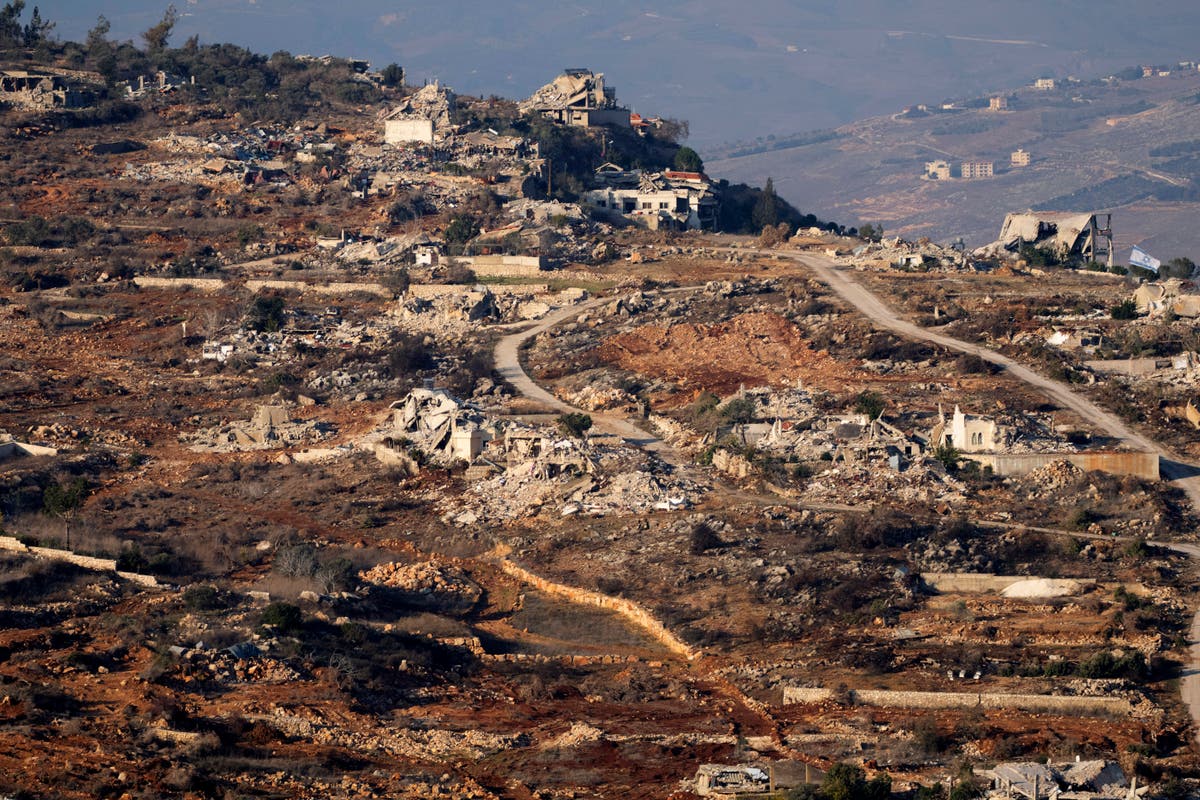Israel has threatened a harsher war in Lebanon if a ceasefire with Hezbollah fails, warning it will directly target the Lebanese state and advance deeper into the country – after the deadliest day since a fragile truce was agreed last week.
Israeli strikes have killed at least 13 people since Monday alone, according to Lebanese authorities, while Hezbollah has shelled an Israeli military post, piling pressure on the deal.
Residents of south Lebanon, who have only just returned to their homes after 14 months of fighting, told The Independent the bombing overnight was “terrifying” and they are worried the ceasefire will not hold.
In the bleakest threat over the deal yet, Israel’s Defence Minister, Israel Katz, warned if the truce does collapse, “we will act strongly” and target the state, not just Hezbollah.
“We will go deeper, and the most important thing they need to know: that there will no longer be an exemption for the state of Lebanon,” Defence Minister Israel Katz said during a visit to the northern border region.
“If until now we separated the state of Lebanon from Hezbollah… it will no longer be [like this].” The Israeli military’s chief of staff also said on Tuesday that troops were patrolling inside south Lebanon with additional commanders.
Despite the truce, Israeli forces have continued strikes against what they say are Hezbollah fighters who have ignored the agreement to halt attacks or to withdraw beyond the Litani River, 18 miles (30 kilometres) from the Lebanon-Israeli border.
Nabih Berri, the speaker of the Lebanese parliament and an ally of Hezbollah – who negotiated the truce on behalf of Lebanon – told local media that Beirut had recorded at least 54 ceasefire violations by Israel since last Wednesday.
Together with caretaker Prime Minister Najib Mikati, he reportedly spoke to officials at the White House and the French president late on Monday as the situation escalated.
A US State Department spokesperson, Matt Miller, told reporters that the ceasefire “is holding” and that Washington. had “anticipated that there might be violations”.
But Mourad, 53, a Syrian refugee near Bint Jbeil in south Lebanon, said the situation was so tense – and the fire from Israel so heavy – that families who returned during the ceasefire were evacuating again.
“Last night, they bombed areas nearby – it was terrifying, and even now Israeli drones are very low and loud,” the father-of-six told The Independent. “Everyone is worried the ceasefire will not hold. So many people just returned to their homes; they are worried we will all be displaced again.”
The potential failure of the ceasefire deal in Lebanon comes as neighbouring Syria plunges deeper into conflict, with the resumption of the 13-year civil war in the wake of insurgents storming the second city of Aleppo over the weekend. On Tuesday, forces captured four new towns, bringing them closer to the central city of Hama, held by the regime of Bashar al-Assad.
Meanwhile, Syrian state media and pro-government outlets reported that Assad’s forces – who have Iranian and Russian support – managed to recapture the village of Khanaser along the road that leads to Aleppo.
A coalition of Turkish-backed forces, led by Islamist group Hayat Tahrir al-Sham in a shock attack that sent regime troops, who have held the city since 2016, running.
Activists on the ground told The Independent insurgents were now just 10 miles from Hama, the country’s fourth-largest city.
“We are going in the direction of Hama the city and after that, God willing, to Homs, and then to Damascus and the rest of Syria will be liberated again with God’s will,” said HTS member Abu Abdo al-Hamawi.
The long civil war seeking Assad’s overthrow has killed an estimated half a million people over the past 13 years. The increasingly global dynamic of the war has only deepened the crisis.
On Tuesday, Iranian Foreign Minister Abbas Araqchi said Tehran would consider deploying troops to Syria if requested by Damascus, in an interview with Qatari-owned Arabic media outlet Al-Araby Al-Jadeed on Tuesday.
The day before, hundreds of Iran-backed Iraqi militia fighters reportedly entered Syria to back up Syrian government forces,.
Ankara, meanwhile, said that Turkish President Tayyip Erdogan had discussed the renewed outbreak of war with Russian President Vladimir Putin, whose warplanes were also involved in the fighting.
On the ground, aid groups have warned that the chaos and violence are now causing serious food shortages in the north amid the winter cold.
In the Idlib countryside, Syrian refugees who had fled the war in Lebanon to Syria, only to find themselves on a new frontline, said they felt they were “followed by war”. They said ferocious Syrian regime and Russian airstrikes had hit civilian areas, including hospitals.
“My son is crying all night from fear of the bombing,” said Mariam, who had been based in Saida in Lebanon until a few months ago and was now living in a tent close to the frontline – on the road to Hama.
“We can’t go back to Lebanon as the borders are closed.”
Tanya Evans, Country Director in Syria for the NGO the International Rescue Committee (IRC) warned that hospitals were being hit, calling this “yet another devastating chapter in Syria’s now 14th year of crisis.”
“As many as 45,000 people are reported to have been displaced already, including many IRC staff and clients,” Ms Evans said.
“While the UN estimates 200,000 to 400,000 could be internally displaced unless hostilities cease.”
The chaos and violence also ignited clashes in the east of Syria. The Kurdish-led Syrian Democratic Forces said in a statement that they captured seven villages from pro-government fighters. Syrian state media, however, denied that the villages were captured by the US-backed SDF, saying that the attack was repelled.
The villages are close to a base housing US troops in the area that is near Iraq.

